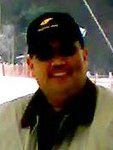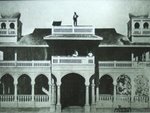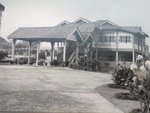I have been reading about the controversies of celebrating Maulidur Rasul not realising that in our very own Brunei Times, Gabriel Haddad had written an article about the celebrations where Maulid was celebrated at the prophet's home. Gabriel Haddad's article was published on 20th March 2008:-
+++++
FOR centuries, the birthday of Prophet Muhammad, upon him blessings and peace, was celebrated in and around the actual house in Mekah where he was born. Since the Arabic words for "birthday" and "birthplace" are one and the same, it was literally a "Maulud within Maulud".
In his book Akhbar Makka the third-century historian of the Mother of Cities, al-Azraqi, mentions as one of the many places in Mekah in which the performance of salat is desirable the house where the Prophet was born (mawlid al-Nabi). The noble house (located in what became known as Suq al-Layl, Shuaab Bani Amir, Shuaab Ali and Shuaab al-Mawlid, present-day Qashshashiyya Street in Mekah), belonged to his father Abd Allah by inheritance from his father Abd al-Muttalib, then passed on to the Prophet himself. It is said that the Prophet passed it on to his cousin Aqil ibn Abi Talib in whose hand it remained even after the conquest of Mekah.
Aqil's son sold it to Muhammad ibn Yusuf the brother of al-Hajjaj. He expanded it and the house became known as al-Bayda' and Dar Ibn Yusuf. When al-Khayzaran the mother of the caliphs Musa al-Hadi and Harun al-Rashid performed pilgrimage, she brought out Ibn Yusuf from the house and turned it into a mosque, after which the house became known as Zuqaq al-Mawlid.
The Quranic scholar al-Naqqash (266-351) mentions this Birthplace Mosque as a place where doa by noon on Yawm al-Ithnayn (Mondays) is answered.
Ibn Jubayr (540-614) in his Rihla ("Travels") states: "This blessed place (the Birthplace Mosque of the Prophet) is opened, and all men enter it to derive blessing from it (mutabarrikin bih) on every Monday of the month of Rabi al-Awwal, for on that day and in that month was born the Prophet."
The 7th-century historians Abu al-Abbas al-Azafi and his son Abu al-Qasim al-Azafi wrote in their Kitab al-Durr al-Munazzam: "Pious pilgrims and prominent travellers testified that, on the day of the mawlid in Mecca, no activities are undertaken, and nothing is sold or bought, except by the people who are busy visiting his noble birthplace, and rush to it. On this day the Kaabah is opened and visited."
The famous eighth-century historian Ibn Battuta relates in his Rihla that on every Jumua after the salat and also on the birthday of the Prophet, the door of the Kaabah is opened by the head of the Banu Shayba the doorkeepers of the Kaabah while on the Maulud, the Shafii head judge of Mekah, Najm al-Din Muhammad ibn al-Imam Muhyi al-Din al-Tabari, distributed food to the descendants of the Prophet and to the people of Mekah.
The house is described in full by the ninth-century historian Taqi al-Din al-Fasi in his book Shifa' al-Gharam bi-Akhbar al-Balad al-Haram.
The following description consolidates eyewitness accounts by three 10th-century authorities: the historian Ibn Zahira from his Jami al-Latif fi Fadli Makkata wa-Ahliha; al-Haytami from his book al-Mawlid al-Sharif al-Muazzam; and the historian al-Nahrawali from al-Ilmam bi-Alam Bayt Allah al-Haram:
Each year on the twelfth of Rabi al-Awwal, after salat Maghrib, the four qadis of Mekah (representing the Four Sunni Schools) and large groups of people including the jurists and notables of Mekah, Shaykhs, zawiya teachers and students, magistrates and scholars, leave the Mosque and set out collectively for a visit to the birthplace of the Prophet, shouting out zikir and tahlil (a statement that there is no god but Allah).
The houses on the route are illuminated with numerous lanterns and large candles, and a great many people are out and about. They all wear special clothes and they take their children with them.
Inside the birthplace, a special sermon for the occasion of the birthday of the Prophet is delivered. Hereafter the doa for the (Ottoman) Sultan, the Emir of Mekah, and the Shafii qadi is performed and all pray humbly.
Shortly before the Isyak prayer, the whole party returns to the Great Mosque, which is almost overcrowded, and sit down in rows at the foot of Maqam Ibrahim. In the mosque, a preacher first mentions the tahmid (a statement that all praise only be to Allah) and tahlil. Once again the doa for the Sultan, the Emir, and the Shafii qadi is performed, followed by the Isyak prayer.
A similar description is given by al-Diyarbakri (d 960) in his great Sirah entitled Ta'rikh al-Khamis fi Akhbari Anfasi Nafis.
Shaykh al-Islam Ibn Hajar al-Haytami al-Makki (909- 974) in the beginning of his commentary on al-Busiri's Hamziyya poem mentions "the present well-known mosque that was the house where the Prophet, upon him blessings and peace, was born."
Muhammad Labib al-Battanuni in the year 1327/1909 in his book al-Rihlat al-Hijaziyya described the house in similar detail as others before him and the fact that "al-Khayzaran turned it into a mosque and it remains thus to our present day".
Knowledge and upkeep of the hallowed birthplace of the Prophet is mass-transmitted. From Abbasid times the Muslims upkept the Birthplace Mosque for centuries, each king and prince of Egypt, Yemen, Syria and the Ottoman Sultans buttressing it and lavishing upon it gifts and precious ornaments from East and West until the Hijaz was overrun by zealots 200 years ago, at which time the Mosque was destroyed and its endowments dispersed.
This act was committed in ignorance of the explicit hadith, "Do not raze the vestiges of the past for they are the adornment of Madina", as narrated from Ibn Umar by al-Tahawi in Sharh Ma'ani al-Athar.
Dr Muhammad Said al-Buti wrote in his preface to Sayyid Yusuf al-Rifai's book Advice to our brothers the scholars of Najd:
"I truly do not know if the Islamic World ever concurred in its indignation over a single matter in its entire history the way it does today over what is being perpetrated by the brethren who are in charge of the Kingdom of Saudi Arabia and by its scholars in the evisceration of Makka and Madina and their vicinities of all the historical remnants connected with the life of the Messenger of God, upon him blessings and peace, both as a private person and as a Prophet, and, subsequently, their perpetrating deeds that violate Islamic Law and violate the method which the pious Predecessors used to follow."
Years later, King Abd al-Aziz ibn Saud gave the vacant land to the Amin al-Asima at that time, Shaykh Abbas ibn Yusuf al-Qattan, who built upon it the library known as Maktabat Makkat al-Mukarrama. The library still stands at the time these lines are written.
+++++
Welcome to my private journal generally on Brunei issues. Any opinions expressed are in my personal capacity. All rights to the articles are reserved.
Monday, March 16, 2009
Tuesday, March 10, 2009
US Suspend Joining P4 - Brunei, NZ, Singapore, Chile
Mark Peart on March 10 2009 reported on the National Business Review:
+++++
Suspension of Transpac talks will damage trade agenda
The Obama administration’s decision to suspend its participation in the Transpac regional trade agreement negotiations, in which New Zealand is a key participant, is a major setback for this country’s trade liberalisation agenda, despite the reassuring noises to the contrary issuing forth from government ministers.
Transpac is the Trans-Pacific economic co-operation agreement which was known in a former life as P4. It was founded by New Zealand, Singapore and Chile, and was later joined by Brunei.
The US is a relative newcomer to the negotiations, having initially restricted its interest to financial services and investment. However, its decision last year to seek full membership of the pact was a lightning rod for Australia, Peru and, more recently, Vietnam to join the negotiations as well.
A spokeswoman for the US embassy in Wellington, Janine Burns, confirms that the next round of Transpac negotiations, which was to have started in Singapore on March 30, has been postponed. No date for a likely resumption has been given. However, such a comprehensive review of US trade policy will not be completed overnight.
Ms Burns says key US cabinet officials-including Trade Representative Ron Kirk (whose congressional confirmation hearing is being held this week) are not yet in place.
“These senior policy makers need to assume their positions and have adequate time to review US. trade policies, including the TPP, before we can agree on next steps on this and other major trade policies,” she says.
While it can be argued that it is sensible to do such a stocktake now, there is a danger that US officials will use it as an opportunity to embark on a protectionist path.
New Zealand has a great deal at stake in the ultimate outcome of the review, as the expansion of TransPac has been seen up until now as a more direct mechanism for improved market access and reduced tariffs for NZ goods services than the more politically fraught bilateral FTA proposal, which has long languished despite a strong improvement in US-NZ relations during the past two to three years.
The US push for full membership in TransPac, indicated while President George W Bush’s administration was in power, enlivened separate but related efforts for a more economically integrated Asia-Pacific region.
The pace of Asia-Pacific trade growth must surely pull back while the US sits on the sidelines engrossed in its review. The US decision makes assessing President Barack Obama’s free trade proclivities even more difficult.
As a presidential candidate last year his free trade rhetoric was hawkish in the extreme, especially as far as the future of the North America Free Trade Agreement (Nafta), which includes the US, Canada and Mexico, is concerned.
Mr Obama’s newly-released trade policy agenda for 2009 says the administration will work with Canada and Mexico to identify ways in which Nafta could be improved without having an adverse effect on trade.
“We will do this in a collaborative spirit and emphasize ways in which this process can benefit the citizens of all three countries,” he says.
As far as proposals for new bilateral and regional agreements are concerned they will be considered when they promise to deliver “significant benefits consistent with our national economic policies,” President Mr Obama says.
New Zealand and its fellow Transpac partners can only hope the administration sees a resumed participation as delivering just those benefits.
+++++
+++++
Suspension of Transpac talks will damage trade agenda
The Obama administration’s decision to suspend its participation in the Transpac regional trade agreement negotiations, in which New Zealand is a key participant, is a major setback for this country’s trade liberalisation agenda, despite the reassuring noises to the contrary issuing forth from government ministers.
Transpac is the Trans-Pacific economic co-operation agreement which was known in a former life as P4. It was founded by New Zealand, Singapore and Chile, and was later joined by Brunei.
The US is a relative newcomer to the negotiations, having initially restricted its interest to financial services and investment. However, its decision last year to seek full membership of the pact was a lightning rod for Australia, Peru and, more recently, Vietnam to join the negotiations as well.
A spokeswoman for the US embassy in Wellington, Janine Burns, confirms that the next round of Transpac negotiations, which was to have started in Singapore on March 30, has been postponed. No date for a likely resumption has been given. However, such a comprehensive review of US trade policy will not be completed overnight.
Ms Burns says key US cabinet officials-including Trade Representative Ron Kirk (whose congressional confirmation hearing is being held this week) are not yet in place.
“These senior policy makers need to assume their positions and have adequate time to review US. trade policies, including the TPP, before we can agree on next steps on this and other major trade policies,” she says.
While it can be argued that it is sensible to do such a stocktake now, there is a danger that US officials will use it as an opportunity to embark on a protectionist path.
New Zealand has a great deal at stake in the ultimate outcome of the review, as the expansion of TransPac has been seen up until now as a more direct mechanism for improved market access and reduced tariffs for NZ goods services than the more politically fraught bilateral FTA proposal, which has long languished despite a strong improvement in US-NZ relations during the past two to three years.
The US push for full membership in TransPac, indicated while President George W Bush’s administration was in power, enlivened separate but related efforts for a more economically integrated Asia-Pacific region.
The pace of Asia-Pacific trade growth must surely pull back while the US sits on the sidelines engrossed in its review. The US decision makes assessing President Barack Obama’s free trade proclivities even more difficult.
As a presidential candidate last year his free trade rhetoric was hawkish in the extreme, especially as far as the future of the North America Free Trade Agreement (Nafta), which includes the US, Canada and Mexico, is concerned.
Mr Obama’s newly-released trade policy agenda for 2009 says the administration will work with Canada and Mexico to identify ways in which Nafta could be improved without having an adverse effect on trade.
“We will do this in a collaborative spirit and emphasize ways in which this process can benefit the citizens of all three countries,” he says.
As far as proposals for new bilateral and regional agreements are concerned they will be considered when they promise to deliver “significant benefits consistent with our national economic policies,” President Mr Obama says.
New Zealand and its fellow Transpac partners can only hope the administration sees a resumed participation as delivering just those benefits.
+++++
Sunday, February 15, 2009
Mosque and Palace
[Note: On 14th February 2009, Melanie Wright wrote in the UK's Mirror about Brunei's Crown Prince here, whether accurate or not, but The Mirror definitely got the photo wrong. Labelling it as the Palace when in fact it is the mosque.]
+++++

Two-year-old heir to the Sultan of Brunei's fortune is the world’s richest baby
Al-Muhtadee Billah is the 34-year-old heir to the Sultan of oil-rich Brunei and stands to inherit £15billion.
His 2004 marriage cost £2.8million and his vast fleet of cars includes Lamborghinis, Mercs and Ferraris.
And Al-Muhtadee’s two-year-old son Abdul Muntaqim is the richest baby in the world.
When he was born, a 19-gun salute was fired from the Sultan’s Grand Palace (above).
+++++
+++++

Two-year-old heir to the Sultan of Brunei's fortune is the world’s richest baby
Al-Muhtadee Billah is the 34-year-old heir to the Sultan of oil-rich Brunei and stands to inherit £15billion.
His 2004 marriage cost £2.8million and his vast fleet of cars includes Lamborghinis, Mercs and Ferraris.
And Al-Muhtadee’s two-year-old son Abdul Muntaqim is the richest baby in the world.
When he was born, a 19-gun salute was fired from the Sultan’s Grand Palace (above).
+++++
Thursday, February 5, 2009
The Guardian correction
The Guardian, UK reported the following on 5th February 2009:-
++++++
In an article headlined The playboy prince is on the loose (30 January, page 3, G2) we said it had been reported on the gossip pages that Prince Azim of Brunei threw a party for the Pussycat Dolls at the Mahiki nightclub in London. The office of the Sultan of Brunei has asked us to point out that this information is incorrect.
++++++
++++++
In an article headlined The playboy prince is on the loose (30 January, page 3, G2) we said it had been reported on the gossip pages that Prince Azim of Brunei threw a party for the Pussycat Dolls at the Mahiki nightclub in London. The office of the Sultan of Brunei has asked us to point out that this information is incorrect.
++++++
Tuesday, February 3, 2009
Reliv expands into Brunei
St Louis Business Journal reported on 3rd February 2009 the following:-
++++++
Reliv International Inc. said Monday it is expanding into Brunei to strengthen its business in Asia.
The addition brings to 14 the number of countries in which Reliv conducts business.
Brunei is expected to complement Reliv’s growing business in Malaysia, which surrounds Brunei on three sides, the company said.
Reliv International Inc. (Nasdaq: RELV), based in Chesterfield, Mo., is a developer, manufacturer and marketer of a proprietary line of nutritional supplements.
++++++
++++++
Reliv International Inc. said Monday it is expanding into Brunei to strengthen its business in Asia.
The addition brings to 14 the number of countries in which Reliv conducts business.
Brunei is expected to complement Reliv’s growing business in Malaysia, which surrounds Brunei on three sides, the company said.
Reliv International Inc. (Nasdaq: RELV), based in Chesterfield, Mo., is a developer, manufacturer and marketer of a proprietary line of nutritional supplements.
++++++
Subscribe to:
Posts (Atom)











